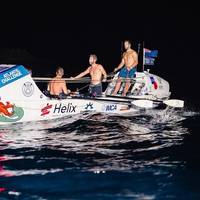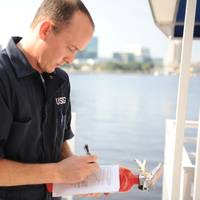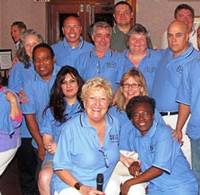Seven Dead, Others Feared Drowned After Spanish Trawler Sinks off Canada
At least seven crew from a Spanish trawler have died and three were plucked from a life raft after their ship sank off the Canadian coast on Tuesday, an official said, as rescuers searched for more survivors in the bitterly cold Atlantic waters.The vessel, the Villa de Pitanxo, with a crew of 24 comprising 16 Spaniards, five Peruvians and three Ghanaians, launched a distress beacon at 0424 GMT, Spain's fisheries ministry said.It sank around 450 km (280 miles) east-southeast of Newfoundland, the ministry said."Seven people have been found dead," said Alberto Nunez Feijoo, the leader of Spain's Galicia region where the vessel and several of its crew were from."There were two Galician fishing boats in the area…
O&G Saturation Divers Complete Cross-Atlantic Row

A group of four saturation divers from the U.K. recently rowed across the Atlantic Ocean to tackle a challenge of lifetime while raising money for a local cancer charity.Chris Ayres, Lewis Locke, James Piper and Andy Taw—all employed by Helix Energy Solutions Group as deep sea saturation divers—took part in ‘The 2021 Talisker Whisky Atlantic Challenge’, which saw the four men row 3,000 miles from La Gomera, the Canary Islands, to Antigua in The Caribbean to raise money for Wessex Cancer Trust.
Regulatory Reform: Good Ideas … Ready to Start?

Regulatory reform is one of President Trump’s priority agenda items. Upon taking office, the President issued a number of Executive Orders focusing attention and demanding action on the myriad of regulations impacting American businesses.Last May, the reform spotlight fell on maritime regulations when the White House Office of Management and Budget (OMB), published a Request for Information (RFI) on how the government should “prudently manage regulatory costs imposed on the maritime sector.” OMB…
New Player Enters the Decommissioning Market

A new entrant to North Sea decommissioning, Well-Safe Solutions was established by a group of oil industry stalwarts Alasdair Locke, Mark Patterson and Paul Warwick, setting out to provide a new approach to the safe and cost-efficient decommissioning of subsea wells. The new start company, which aims to attract £200 million ($260 million) in investment and create 400 new jobs, will offer a specialist well abandonment service. Well-Safe has secured funding from Scottish Enterprise…
Coast Guard’s Proposed Maritime Preemption Assessment Framework

In the May 2013 issue of Maritime Reporter & Engineering News, Dennis Bryant published a provocative article titled Rebuilding the Presumption of Preemption. The Coast Guard has asserted in the past and believes today that consistent standards of universal application and enforcement, coupled with Federal initiatives to meet unique regional concerns, best meet local and national safety and environmental goals with the least disruption to maritime commerce. 78 Fed. Reg. 79,243.
The Coast Guard’s Proposed Maritime Preemption Assessment Framework

What it may foretell about the coming towing vessel rule. In the May 2013 issue of Maritime Reporter & Engineering News, Dennis Bryant published a provocative article titled Rebuilding the Presumption of Preemption. The Coast Guard has asserted in the past and believes today that consistent standards of universal application and enforcement, coupled with Federal initiatives to meet unique regional concerns, best meet local and national safety and environmental goals with the least disruption to maritime commerce. 78 Fed. Reg. 79,243.
The Articulated Tug Barge (ATB) Quandary

Inconsistent Rules Create Uneven Application of Standards. (Captain) Jeff Cowan explores the how and why of the safety gap that comes as a direct result. Oil tankers and cargo vessels face a number of oil spill prevention regulations especially along the U.S. coast. Surprisingly, many of the regulations governing T-2 and T-3 sized tankers which carry between 120,000 and 146,000 barrels of oil do not apply to the new Articulated Tug Barges (ATBs) that may carry as much if not more (400,000+ barrels).
Summary Judgment Sought Against Mass. 2009 Oil Spill Law
The American Waterways Operators (AWO), the International Association of Independent Tanker Owners (INTERTANKO), the Chamber of Shipping of America, the International Chamber of Shipping, and the International Group of Protection & Indemnity Clubs filed a Motion for Summary Judgment on Friday, January 28 in U.S. District Court for the District of Massachusetts against a 2009 Massachusetts oil spill law. The plaintiffs also requested that the judge issue a Permanent Injunction to enjoin its enforcement. The Motion charges that the spill law is unconstitutional and undermines marine safety and environmental protection. The state law being challenged compels vessel operators to comply with state – not Federal – requirements for transit through Buzzards Bay.
Ellicott Dredges 125th Anniversary

Ellicott Dredges, founded in 1885, celebrated its 125th anniversary by taking a dinner cruise around the Port of Baltimore aboard the turn of the century paddlewheel riverboat The Black-Eyed Susan. The Port (which Ellicott's predecessors helped create in the 1700s with the first dredge, a two horse power-driven machine) has written a feature story about Ellicott Dredges in the latest edition of its magazine. The article appears in the September/October 2010 issue. Almost 150 people celebrated Ellicott's 125th anniversary including employees…
Secretary Locke Announces ARRA Awards
On August 20, Commerce Secretary Gary Locke will announce millions of dollars of American Recovery and Reinvestment Act (ARRA) funding to strengthen the economy, create jobs, and support safe and efficient marine commerce and trade, which contributes more than $742b and 13 million jobs to the economy annually. The awarded contracts will help the Commerce Department’s National Oceanic and Atmospheric Administration (NOAA) map the seafloor, collect data in critical coastal areas, and update nautical charts of approximately 2,000 square nautical miles in the Chesapeake Bay and other areas along the Atlantic, Pacific and Gulf of Mexico. The announcement will occur on August 20, 11:15 a.m. at the Half Moone Cruise & Celebration Center, Virginia Room, 1 Waterside Drive, Norfolk, Va. 23510.
When is a victory, not a victory?
As recent events have shown, no single judicial action is likely to have as much impact on the maritime community in the next decade as the Supreme Court?s U.S. v. Locke (Intertanko) decision. Last year, the Supreme Court ruled unanimously that a state could not impose tanker safety standards that exceeded the federal standards set by the Oil Pollution Act of 1990 (OPA 90). At the time, it was widely hailed as a major victory for tanker owners. The decision appeared to limit states? ability to regulate shipping; but on second glance, something far more dangerous to the maritime community was contained within. The Supreme Court outlined a road map for how any state could pass legislation and implement regulations with far reaching implications. The gist of the legal loophole is this. U.S.
Washington State Ferries to Shift to Clean Fuel Initiative
Washington State Ferries (WSF)/Washington State Department of Transportation (WSDOT) will shift the entire ferry fleet to low-sulfur diesel fuel, test ultra-low sulfur diesel fuel, and test biodiesel fuel—all steps that will improve air quality by reducing the amount of harmful substances in the ferries’ diesel fuel exhaust. The ferry system also has upgraded its vessels with more-efficient engines and made operational changes that have reduced fuel consumption and emissions, and will continue seeking new ways to improve fuel efficiency. As a result of all these changes, nearly 10,000 fewer tons of pollutants will be released into the air by ferry fuel emissions.
65th Anniversary: The Tugboat, Towboat and Barge Industry
This year, The American Waterways Operators (AWO), the national trade association for the tugboat, towboat and barge industry, celebrates its 60th anniversary. AWO members, representing the inland, coastal and harbor sectors of the industry, recently marked this milestone at its Spring Convention, recalling the reasons for the association's founding and recognizing the remarkable evolution of the industry over the past six decades. AWO was formed in 1944 in the midst of emerging regulations, priorities and demands for transportation during World War II. Today, AWO members account for 80 percent of the towing industry's active fleet.
Supreme Court Rules Federal Law Preempts State Tank Vessel Regulations
A unanimous Supreme Court ruled the state of Washington overstepped its authority in attempting to regulate the operation of tank vessels in state waters. The Court's 9-0 decision in the closely watched case (Intertanko v. Locke, United States v. Locke) reversed the June 1998 decision of the Ninth Circuit Court of Appeals upholding most of the state's "Best Achievable Protection" (BAP) standards for tank vessels. The Court found sufficient evidence to declare four of the Washington regulations unconstitutional and remanded the case so the validity of the others may be assessed by a lower court "in light of the considerable federal interest at stake and in conformity with the principles" set forth in the Supreme Court decision.
Legal Matters
Senator Slade Gorton (R-Wash.) introduced the "States Prevention of Oil Tanker Spills Act" (S. 2506), which seeks to reinstate Washington state oil tanker safety laws overturned by the Supreme Court in Intertanko v. Locke and United States v. Locke. In a press release, Senator Gorton said, "I disagree with the Court's decision, because I believe Washington State should be allowed to protect its shores as it sees fit." The Gorton legislation would reinstate the right of all states to adopt additional standards beyond existing federal requirements governing the operation, maintenance, equipment, personnel and manning of oil tankers. While the legislation would apply to all coastal states, Gorton's interest is focused on recently overturned Washington statutes.
Oil Match Confirmed in Dalco Passage Spill
Gov. Gary Locke and RADM Jeffrey Garrett announced today that tests conducted by both state and federal laboratories indicate the Polar Texas oil tanker, owned by ConocoPhillips, is the source of the oil that soiled beaches around Dalco Passage in October. State and federal investigators say oil samples connected to the Polar Texas match oil from the spill. "We have a match, which makes us confident that we know the source of the oil spill," Locke said. "I applaud the hard work and focus of our men and women in bringing the investigation to this point," said Garrett. The spill of about 1,000 to 1,500 gallons was first discovered in the early-morning hours of Oct. 14, but response efforts were hampered by darkness, bad weather and incomplete information. The U.S.
Marzano Named President of the Port of Tacoma Commission
Dick Marzano Thursday was appointed President of the Port of Tacoma Commission by his fellow commissioners at the Port's first Commission of the year, held Thursday, January 9. President. approved by the Port Commission in 1999. Secretary in 2003. Commission in November 1995. markets that enhance trade opportunities. of the Propeller Club of the United States. Directors of the Hospitality Kitchen at St. Foss Waterway Development Authority.
NYC Considers Local Law on Passenger Vessels
The New York City Council is considering a proposed Local Law
Spill Prevention and Response Protocols Formalized
The Thirteenth U.S. Coast Guard District and Washington state (Ecology) have formalized protocols for improved coordination of their oil pollution prevention and response efforts in Washington state waters. Capt. Myles Boothe, Chief, 13th Coast Guard District Marine Safety Division; and Dale Jensen, Ecology’s spills program manager, signed the protocols last Friday at the 13th Coast Guard District office. In May 2001, Governor Gary Locke and USCG Rear Adm. Erroll M. Brown signed a Memorandum of Agreement to work together to achieve a coordinated and efficient working relationship. The new protocols for Washington waters apply to all oil spill incidents and include information sharing…
Are Fast Ferries Too Fast?
British Columbia's fast ferries may be too fast for their own good, according to CANOE columnist Jim Hume. The British Columbia Ferry Corporation first sailed The Explorer on June 17, 1999, with regular service from Vancouver Island (Nanaimo) to Mainland (Horseshoe Bay) starting July 1. While the fast-cats can operate faster than traditional ferries, they are currently only shaving off 14 minutes of their scheduled run, not the 25 minutes promised. It turns out when the fast boat operates at top speeds in the confined waters of its scheduled route, it raises six-ft. waves along the shore. Additionally, high-speed fast ferry Snohomish, built by Dakota Creek Industries, Inc.
New Budget Focus: Safety, Passenger Ferries
The two-year budget for the Washington State Ferries system approved in the spring by the state Legislature will create a modern fleet of passenger-only ferries and terminals to help move more people across Puget Sound. But the new spending plan also represents a significant investment in two other key areas: renovating older terminals and expanding safety programs throughout the fleet. The budget is broken down into two areas: the $303 million operating budget, which covers the day-to-day operations at WSF, and the $287 million capital budget, which addresses construction needs. In the capital budget, $116 million came from voter-approved Referendum 49 funds.







